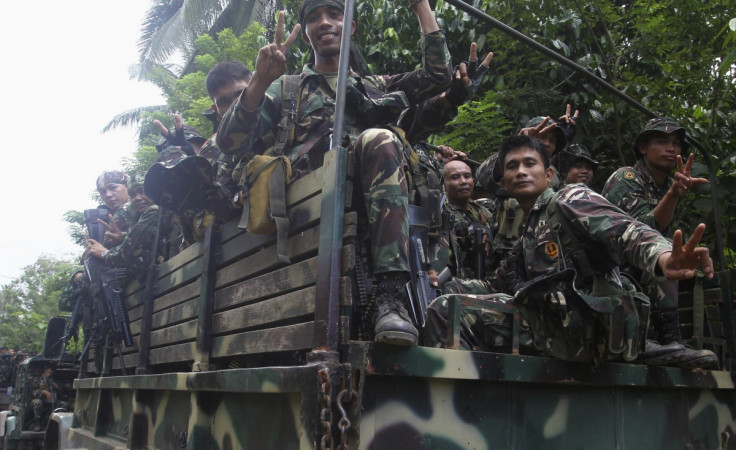Isis claims attack on Philippines Army which left 23 dead after 'detonating 7 trucks'

The Islamic State (Isis) has claimed responsibility for the killing of 23 Philippines soldiers on Basilan Island by 'detonating seven trucks'. The attack, which took place on 9 April, also left at least three militants dead – it is not clear if the trucks were blown up by IED's or suicide bombers.
The Island, about 550m (880km) south of Manila, has long been a hotbed of extremist supporters with two major terrorist groups, Abu Sayyaf and the Moro Islamic Liberation Front, both based here. Daesh (Isis) said that three of their militants were killed in the attack which left a further 53 Filipino troops injured.
It is thought that the army fought a 10-hour battle with around 120 Muslim rebels. According to reports their mission was to kill or capture Abu Sayyaf leader Isnilon Hapilon, an infamous insurgent for whom the US State Department has offered a bounty of up to $5m (£3.5m).
"With the grace of God we were able to detonate seven trucks carrying soldiers," an Isis statement said according to Reuters.
The Filipino Army say that they killed five, not three, militants including a man called Ubaida, a son of Hapilon, Major Filemon Tan said. Abu Sayyaf, known for extortion, kidnappings and bombings has not made a statement since the battle.
The assault took place as the nation marked the Day of Valor – which remembers Filipinos who died in the Second World War. The military has been battling Muslim separatist rebels as well as Marxist guerrillas on the Sulu Archipelago, where Basilan Island is located.
In March 2014, the Philippines government signed a peace deal with the Moro Islamic Liberation Front, the largest Muslim rebel group. It promised to grant autonomy in the southern Islands, ending a 45-year conflict with the group that left 120,000 people dead.
Abu Sayyaf, formed in 1991, continued fighting the government, and in July 2014 gave bayah (or pledged allegiance) to Daesh leader Abu Bakr al-Baghdadi.
In March this year Abu Sayyaf hijacked an Indonesian vessel taking 10 crew members hostage. The Indonesian navy confirmed the boat has been seized by the militants, based on nearby Jolo Island, and the government said they have received a ransom demand from the captors – although it is not clear if the demands had been met as of yet.
And on 8 April this year, Rolando del Torchio, a former priest turned businessman, was finally released by the insurgents after six months in captivity. A ransom was reportedly paid.
© Copyright IBTimes 2025. All rights reserved.






















